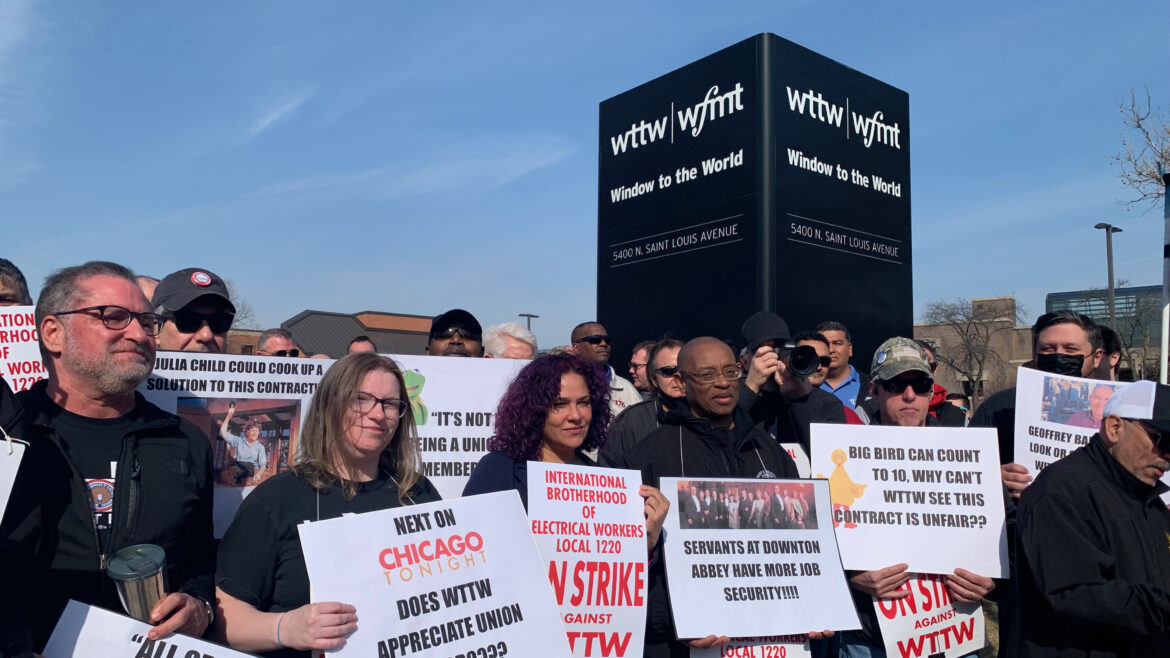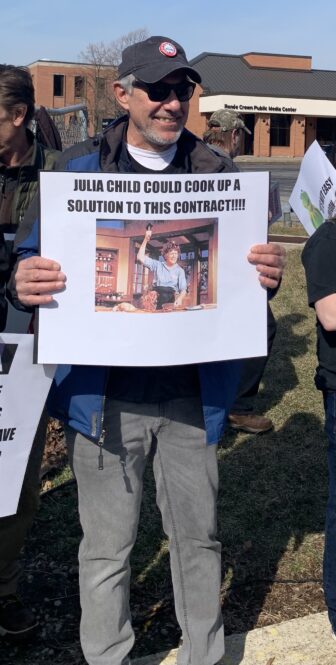WTTW technicians strike amid concerns over threats to job duties

Leigh Giangreco
IBEW union members strike outside WTTW's headquarters Monday,
Broadcast technicians employed by WTTW in Chicago have gone on strike after nearly a year of collective bargaining negotiations and concerns over protecting union jobs.
Local Union 1220 of the International Brotherhood of Electrical Workers called the strike March 16. IBEW represents around two dozen workers at WTTW, including technicians, graphic artists and floor crew members.
Workers allege that station management has threatened their work jurisdiction in an attempt to hire nonunion labor. Over the last four years, the union has filed four grievances that advanced to arbitration. In all cases, arbitrators ruled in favor of the union.
“The last decision was awarded just days before collective bargaining began on May 7, 2021,” according to an IBEW statement. “The night after bargaining had begun, WTTW’s counsel gave intent to terminate the entire agreement, setting the tone going forward.”
WTTW has refused to come back to the bargaining table, union members said. In a statement Tuesday, a WTTW spokesperson said the station is ready to return to negotiations and has not received a request to do so.
The union has 23 members in its bargaining unit, down from 32 two years ago, said John Rizzo, business manager at Local 1220. Although WTTW has hired dozens of new employees in the last two years, none of those workers falls within the union ranks, according to Local 1220.
All 23 IBEW members protested Monday outside WTTW’s building, according to the union, accompanied by Chicago Mayor Lori Lightfoot and representatives from Local 1220. Lightfoot, who has clashed with the Chicago Teachers Union and the city’s Fraternal Order of Police, received an enthusiastic welcome from the crowd of broadcast workers.
“There can be no question that Chicago is a union town,” Lightfoot said. “So my hope is that we will come to the table, that a deal will get done. And I stand ready in any way possible.”
Past grievances
In the four arbitration cases between 2018 and 2021, the union argued that WTTW had violated the collective bargaining agreement by using photographs and video shot by nonunion personnel. That included content from WTTW reporters and producers who are not IBEW members, as well the Chicago mayor’s office.
WTTW maintains that contract language at the time authorized use of the video content and has proposed adjustments to future contract language to “address the varying interpretations,” a spokesperson said.
Even after arbitrators sustained those grievances, the station has still tried to use footage from the general public or third parties, Rizzo said.
“We have instances where they want to send out other things to edit to third parties,” he said. “So really, they’re misspending the money on the work that we already do.”
Other union members echoed Rizzo’s concern that contract negotiations have become more difficult over the last four years, particularly around issues of work jurisdiction. Michele Strotman, a technical director at WTTW, said she’s worried that hiring nonunion employees unfamiliar with the station’s equipment could potentially damage it.
Strotman also criticized management’s efforts to shrink the geographic range within which union employees must shoot video from a 200-mile radius around WTTW to a 60-mile radius. “I live 65 miles away. So if they wanted to take a story out near my area, they could call and they could hire somebody else,” she said. “We have people in house that are perfectly capable and willing to do that and have in the past always been the ones that have done it.”
A WTTW spokesperson said that the 60-mile range would allow the station to use video from outside territorial limits “so we can cover stories we wouldn’t otherwise be able to cover.”

Two other unions represent WTTW employees, the Screen Actors Guild-American Federation of Television and Radio Artists and the Directors Guild of America. SAG-AFTRA members have shown support for IBEW workers and have not done any IBEW work since the strike began, Rizzo said.
While union members are on strike, other WTTW staffers are filling gaps on flagship programs like Chicago Tonight. EP Jay Smith is overseeing the show’s production while WTTW rotates its news team, a station spokesperson said.
The staffing for Chicago Tonight has dropped significantly compared to a regular staff of up to 30 including news workers, shooters and editors, union members said. On the day the strike began, WTTW aired a best-of version of the show. The following day it broadcast a truncated Chicago Tonight including footage already shot by union members, according to the union.
“I don’t know what their ability is to pull stuff from the archive right now, because that’s normally an IBEW jurisdiction,” Strotman said. “I just don’t feel like anybody’s really willing to budge on anything, and it’s just a shame because we all want to be doing our jobs.”
Correction: Due to an editing error, a photo caption on an earlier version of this story misidentified an attendee at the IBEW protest as a WTTW employee. He is not an employee, according to the station.







